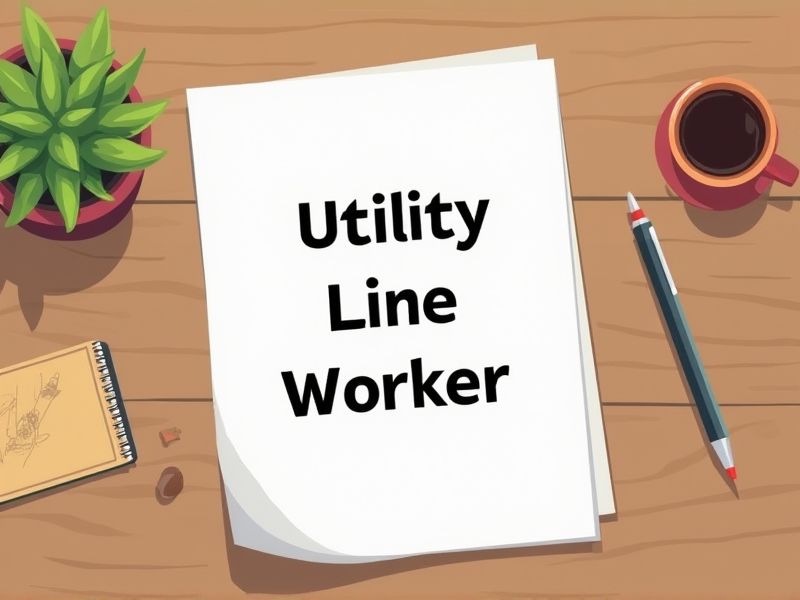
Utility line workers are tasked with the crucial responsibility of installing, maintaining, and repairing power lines, which requires a deep understanding of electrical systems and safety protocols. Certifications ensure that workers possess the necessary technical skills and knowledge to perform their duties safely and efficiently. These credentials also verify a worker's ability to adhere to industry standards and regulations, minimizing the risk of accidents and service disruptions. Here are several key certifications essential for anyone pursuing a career as a utility line worker.
OSHA 10-Hour Construction Safety Certification
Obtaining the OSHA 10-Hour Construction Safety Certification reinforces safety knowledge, which is critical for utility line workers operating in hazardous environments. The certification educates workers on identifying and mitigating potential risks, significantly reducing the likelihood of accidents. Employers increasingly require this certification, enhancing job prospects for utility line workers. Compliance with OSHA standards helps avoid costly fines and enhances overall workplace safety.
OSHA 30-Hour Construction Safety Certification
Utility line workers face hazardous tasks such as working at heights and handling live electrical wires, so the OSHA 30-Hour Construction Safety Certification ensures they understand critical safety protocols. This certification is needed because it provides comprehensive training on identifying and mitigating risks specific to construction and utility environments. Employers require this certification to comply with safety regulations and reduce workplace incidents. Efficient safety practices gained from the training lead to fewer injuries, enhancing overall productivity and worker confidence.
CPR/First Aid Certification
Utility line workers face high-risk situations due to exposure to electrical hazards and heights, increasing their chances of encountering emergencies. CPR/First Aid certification equips them with the necessary skills to provide immediate assistance to coworkers who may experience injuries or health crises on the job. Quick and knowledgeable responses can significantly improve survival rates and mitigate the severity of injuries until professional medical help arrives. Employers may also require certification to comply with safety regulations and demonstrate commitment to worker safety.
NFPA 70E Electrical Safety Certification
NFPA 70E Electrical Safety Certification establishes a framework for utility line workers to identify electrical hazards and implement safe work practices. This certification reduces the risk of electrical injuries and accidents, which are common in high-voltage environments. It ensures compliance with OSHA regulations, avoiding potential legal and financial consequences for employers. Widespread adoption of NFPA 70E standards by employers fosters a culture of safety, ultimately enhancing worker confidence and operational efficiency.
High Voltage Awareness Certification
Utility line workers operate in environments with substantial electrical hazards. High Voltage Awareness Certification provides them with vital knowledge to recognize and manage these risks effectively. Consequently, the certification helps reduce workplace accidents and fatalities. Regulatory standards often mandate this certification, ensuring compliance and safety within the utility industry.
Confined Space Entry Certification
Confined Space Entry Certification is needed for utility line workers to ensure they are equipped to safely navigate potentially hazardous environments like manholes and tunnels. The certification provides them with essential knowledge about gas monitoring, ventilation, and emergency protocols, reducing the risk of accidents. It also ensures legal compliance with occupational health and safety regulations, protecting both the worker and the employer. Proper training prevents incidents that could lead to severe health consequences, financial losses, and operational disruptions.
Aerial Lift Operator Certification
The necessity for Aerial Lift Operator Certification stems from the high-risk environments in which utility line workers operate, ensuring their competency in safely maneuvering equipment at elevations. This certification significantly reduces the likelihood of accidents, thus protecting both workers and the public. Meeting regulatory compliance, such as OSHA standards, is critical for utility companies to avoid legal repercussions. Certified operators increase operational efficiency, as they are trained to handle aerial lifts expertly, minimizing equipment downtime.
Working at Heights Certification
The risk of falls and related injuries increases significantly when utility line workers operate at elevated levels, prompting regulations that necessitate Working at Heights certification. When workers hold this certification, it demonstrates they have received comprehensive training to use personal protective equipment and safety protocols effectively, reducing accident rates. The implementation of industry standards and best practices through certification ensures that workers can efficiently identify hazards and implement preventive measures. Regulatory bodies and employers require this certification to comply with safety regulations and maintain a safe working environment.
Tree Climbing Certification
Utility line workers often operate in environments where power lines are interspersed with trees. Having a tree climbing certification ensures they can safely and efficiently navigate these trees to perform necessary repairs or maintenance. This certification reduces the risk of accidents and injuries related to tree falls or improper technique. Proper training also leads to quicker response times in power restoration during outages or emergencies.
Utility Lineworker Training Program Certification
Utility Lineworker Training Program Certification ensures that workers possess the necessary skills to safely handle high-voltage power lines, reducing the risk of accidents. With the certification, utility companies can ensure their employees are well-versed in the latest industry standards and regulations, enhancing operational efficiency. Certified lineworkers demonstrate proficiency in emergency response scenarios, ensuring prompt restoration of services during power outages. The certification also supports professional development, providing a pathway for career advancement and improved job security in a competitive industry.
Summary
When you attain certifications as a Utility Line Worker, your job prospects typically improve due to enhanced credentials. Employers often view certified workers as more skilled and reliable, which may lead to increased employment opportunities. Certified workers generally experience higher earning potential since organizations value specialized training and knowledge. Moreover, certifications can boost your confidence and job performance, leading to more effective and safe work practices.
